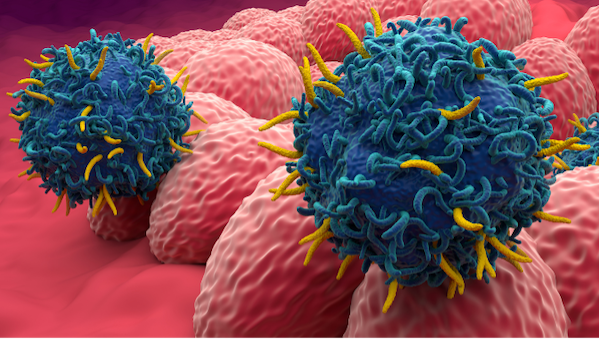ImmunityBio Launches Study to Evaluate Combination of Anktiva, AdHER2DC Cancer Vaccine for Endometrial Cancer
August 10, 2024
Source: drugdu
 226
226
By Don Tracy, Associate Editor
The study aims to explore Anktiva as a potential cornerstone of future immunotherapy treatments for endometrial cancer and other forms of the disease.
 ImmunityBio has initiated a clinical trial to evaluate the combination of Anktiva, their IL-15 superagonist, with the investigational AdHER2DC cancer vaccine, a product of the National Cancer Institute (NCI), as a potential treatment for endometrial cancer. According to the company, the purpose of the trial is to assess the safety and efficacy of this combination therapy in patients with HER2-positive endometrial cancer. The trial comes amid Anktiva’s recent FDA approval for treating BCG-unresponsive non-muscle invasive bladder cancer.1,2
ImmunityBio has initiated a clinical trial to evaluate the combination of Anktiva, their IL-15 superagonist, with the investigational AdHER2DC cancer vaccine, a product of the National Cancer Institute (NCI), as a potential treatment for endometrial cancer. According to the company, the purpose of the trial is to assess the safety and efficacy of this combination therapy in patients with HER2-positive endometrial cancer. The trial comes amid Anktiva’s recent FDA approval for treating BCG-unresponsive non-muscle invasive bladder cancer.1,2
“We are pleased to partner with the NCI on this important cancer control study involving Anktiva, which has demonstrated in clinical trials that activation of memory T cells may help deliver long-duration response well beyond that of checkpoint inhibitors alone,” said Patrick Soon-Shiong, MD, executive chairman, global chief scientific and medical officer, ImmunityBio, in a press release. “We are hopeful that the AdHER2DC investigational vaccine plus Aanktiva will ‘rescue’ the checkpoint inhibitor pembrolizumab and kinase inhibitor lenvatinib and lead to an improved response compared with the current standard of care in this high-risk population.”
The open label, two-arm Phase I/III study will include two phases. Phase one will determine the recommended dose of pembrolizumab, lenvatinib, Anktiva, and AdHER2DC in participants with HER2-positive endometrial cancer. Phase two will evaluate the efficacy of the combination of pembrolizumab, lenvatinib, Anktiva, and the AdHER2DC vaccine in qualified participants as determined by the proportion of participants without disease progression at six months. Enrolling 60 participants, the study is expected to be completed at some point in 2026.
ImmunityBio explained that the AdHER2DC vaccine works by targeting the HER2 protein, which is elevated in 30% of patients with endometrial cancer and in more than 50% of high-risk subtypes. The vaccine uses each participant’s own blood cells obtained through apheresis, a process in which blood is removed from one vein, passed through a machine to filter out target cells, and then returned to the patient through another vein. Anktiva is classified as a first-in-class, IL-15 agonist IgG1 fusion complex, consisting of an IL-15 mutant fused with an IL-15 receptor alpha, which binds with high affinity to IL-15 receptors on NK, CD4+, and CD8+ T cells.1
According to the American Cancer Society (ACS), an estimated 67,880 new cases of endometrial cancer will be diagnosed by the end of the year, with 13,250 women expected to die as a result. In most cases, endometrial cancer effects post-menopausal women. It is most common over the age of 60 years and is uncommon in women under the age of 45 years. The ACS also stated that it is more common in Black women than white women. In the past 10 years, incidence rates have increased by approximately 1% per year in white women and 2% to 3% per year in women of all other racial/ethnic groups. In recent years, it has been one of a few cancers that have seen an increase in mortality rates, growing an estimated 1.7% per year.3
At this time, the AdHER2DC vaccine is investigational, with no safety and efficiacy benchmarks being noted by the FDA or any other regulatory authorities.1
Read more on
- Gan & Lee Pharmaceuticals’ new PROTAC drug GLR2037 tablets have been approved for clinical trials to enter the field of prostate cancer treatment March 3, 2026
- AideaPharmaceuticals plans to raise no more than 1.277 billion yuan through a private placement to focus on the global clinical development of innovative HIV drugs March 3, 2026
- Giant Exits! Its Star Business Acquired March 3, 2026
- Focusing on cardiovascular and cerebrovascular diseases! OpenMediLead Medical Intelligence Dual Engines Launch Internal Testing, Connecting Drug Development and Clinical Diagnosis in a Closed Loop March 3, 2026
- Innovent Biologics Announces Approval of New Indication for BTK Inhibitor “Pitubrutinib” in China March 3, 2026
your submission has already been received.
OK
Subscribe
Please enter a valid Email address!
Submit
The most relevant industry news & insight will be sent to you every two weeks.



